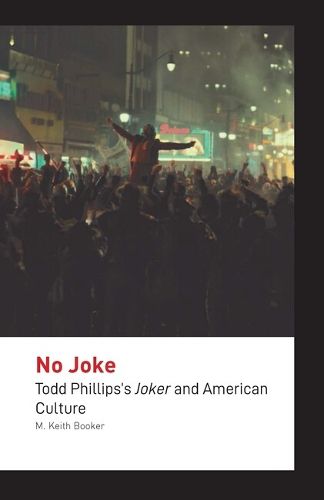Readings Newsletter
Become a Readings Member to make your shopping experience even easier.
Sign in or sign up for free!
You’re not far away from qualifying for FREE standard shipping within Australia
You’ve qualified for FREE standard shipping within Australia
The cart is loading…






No Joke is a detailed examination of Todd Phillips’s Joker, one of the biggest global box-office hits of 2019. While his success was no doubt partly because of the association of its title character with the Batman superhero franchise, Joker is anything but a flashy superhero romp. It does explore the pathologies of its central character and suggest ways in which his life experiences might have driven him to become a supervillain, the arch-enemy of Batman. At the same time, the film leaves open the possibility that its Joker is not, in fact, the same as the one conventionally associated with Batman. In fact, the film leaves open many interpretive possibilities, in keeping with the complex work of postmodern art that it turns out to be. Joker also engages in extensive dialogues with a range of works from modern American culture, especially the films of the 1970s and 1980s, the period in which the action of Joker is set. Moreover, Joker is a highly political film that comments in important ways on American political history from roughly the beginning of the presidency of Richard Nixon through the end of the Trump presidency, with a special focus on the Reagan years. It also comments in more general and fundamental ways on the very nature of American society and American capitalism. All this, and more, is covered in M. Keith Booker’s analysis of one of the most talked-about films of recent years.
$9.00 standard shipping within Australia
FREE standard shipping within Australia for orders over $100.00
Express & International shipping calculated at checkout
No Joke is a detailed examination of Todd Phillips’s Joker, one of the biggest global box-office hits of 2019. While his success was no doubt partly because of the association of its title character with the Batman superhero franchise, Joker is anything but a flashy superhero romp. It does explore the pathologies of its central character and suggest ways in which his life experiences might have driven him to become a supervillain, the arch-enemy of Batman. At the same time, the film leaves open the possibility that its Joker is not, in fact, the same as the one conventionally associated with Batman. In fact, the film leaves open many interpretive possibilities, in keeping with the complex work of postmodern art that it turns out to be. Joker also engages in extensive dialogues with a range of works from modern American culture, especially the films of the 1970s and 1980s, the period in which the action of Joker is set. Moreover, Joker is a highly political film that comments in important ways on American political history from roughly the beginning of the presidency of Richard Nixon through the end of the Trump presidency, with a special focus on the Reagan years. It also comments in more general and fundamental ways on the very nature of American society and American capitalism. All this, and more, is covered in M. Keith Booker’s analysis of one of the most talked-about films of recent years.